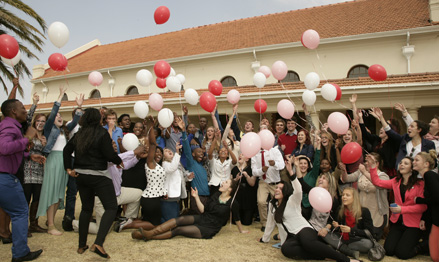Latest News Archive
Please select Category, Year, and then Month to display items
25 March 2024
|
Story Anthony Mthembu
|
Photo Lutendo Mabata
 Prof Nompumelelo Zondi, the newly appointed Vice-Dean: Research and Postgraduate Studies in the Faculty of The Humanities at the University of the Free State (UFS).
Prof Nompumelelo Zondi, the newly appointed Vice-Dean: Research and Postgraduate Studies in the Faculty of The Humanities at the University of the Free State (UFS).
Prof Nompumelelo Zondi has been appointed as Vice-Dean: Research and Postgraduate Studies in the Faculty of The Humanities at the University of the Free State (UFS). Prof Zondi assumed this new role on 1 March 2024 after serving as the Head of Department for African Languages at the University of Pretoria for seven years. “I consider this appointment as an opportunity of growth and learning more about higher education and the Faculty of The Humanities at large,” she said.
Prof Zondi indicates that part of her role is to spearhead the UFS Vision130 within the Faculty of The Humanities, and to ensure that the faculty assists the institution in becoming research-led, student-centred, and globally impactful.
Motivation for assuming this role
One of the primary reasons that led her to consider this role is sharing the knowledge she acquired as part of the Fulbright South African Research Scholar Programme. As a result of that experience and exposure, which went beyond the Ohio State University, she felt it befitting to implement some of the insights she acquired on a bigger scale. Therefore, even though she was impactful in her previous role, Prof Zondi believes that this is an exceptional and more desirable platform to do so. “I feel that I will have easier access to departments within the faculty, while also encouraging and supporting interdepartmental and faculty collaborations,” she explained.
A significant component of Vision 130
He believes that the elements that make up Vision 130 are interrelated. While she considers research central to Vision 130 – as she begins her journey at the UFS, she feels students deserve to be nurtured to further contribute to the university’s impactful research. Thus, student-centredness is the way to go. “I believe that students must be major role players in this Vision130; we must include them in the interactions and discussions that are part of the university’s strategic plan as well as in decision-making processes,” she said. As such, according to Prof Zondi, the more the faculty and the institution care for the students and involve them in Vision130 and in collaborations, the more research outputs the university will achieve.
‘Your capacity for change is limitless’
2013-09-13
|
 |
Ready for the world - students taking part in the 2013 Leadership for Change programme getting ready to travel to universities in the USA, Europe and Asia.
Photo: Johan Roux
12 September 2013 |
“You will change this campus, city, country, continent and the world, because you have the capacity for greatness,” Prof Jonathan Jansen, Vice-Chancellor and Rector of the University of the Free State (UFS), said.
He addressed the 2013 group of first-year students in the Leadership for Change programme at a farewell function before they will leave for universities abroad. The first 104 students from the 2013 total of 144 will depart on 18 September and return on 3 October 2013. The second group of 40 students will be abroad from 11 to 25 January 2014. The students are from the Bloemfontein and Qwaqwa Campuses. They will be accompanied by mentors from the UFS.
The students will visit 17 universities in the USA, Europe and Asia.
The first 71 first-year students in the Leadership for Change programme were sent abroad for two weeks in September 2010 to get intense exposure to the academic, social, cultural and residential lives of students in the USA. In 2011 the student number more than doubled and universities in Europe were included. In July 2012 the programme brought students from around the globe to the UFS for the Global Leadership Summit.
Prof Jansen inspired the young leaders, saying, “If you learn leadership values in your four years of study, a change will come. Build the new value system and take it into the country. Your capacity for change is limitless.”
He encouraged them to learn to know the stranger, not only abroad, but also the beggar at the street corner. “Learn to be comfortable with the beggar, as well as with the professor in the classroom.”
A stringent evaluation and training programme preceded the group’s visit abroad, and Prof Jansen could not formulate their achievement better: “I cannot tell you how proud I am of you.”